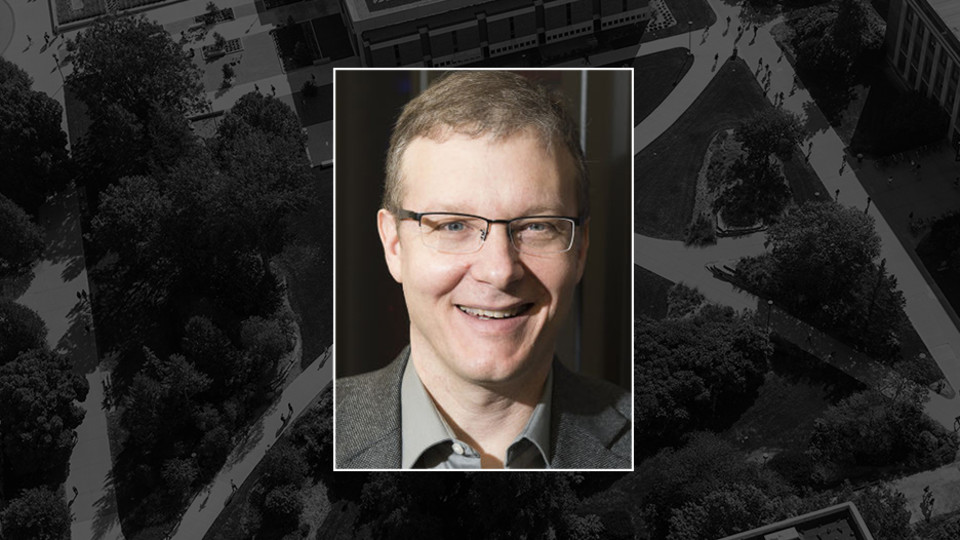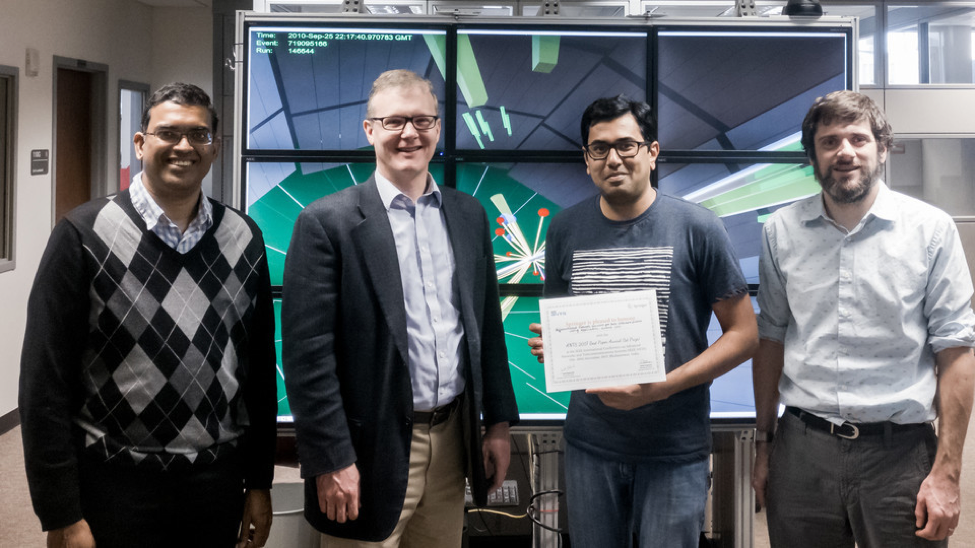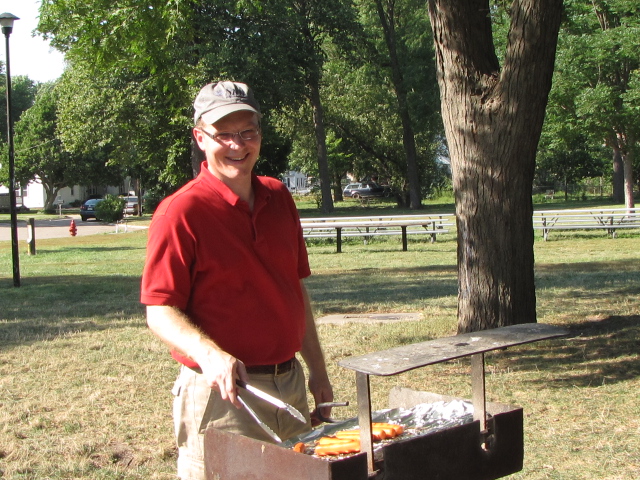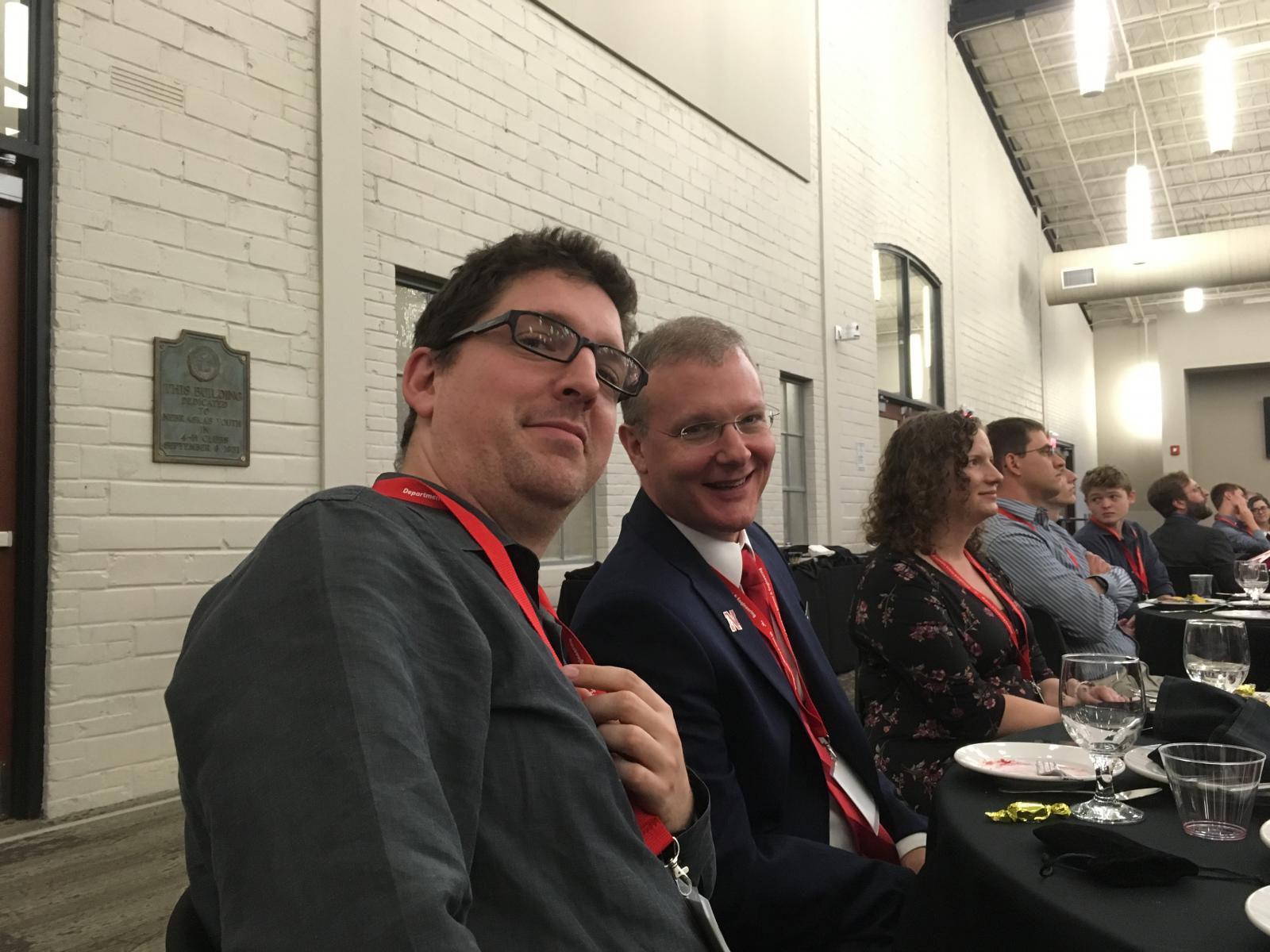Sep 10, 2019
By Victoria Grdina

David R. Swanson, 53, director of the Holland Computer Center and research professor in computer science and engineering, died following a two-vehicle wreck on Aug. 11 in rural Minnesota.
A memorial service will be held for him will be held on Saturday, Sept. 21 at 1 p.m. in the chapel of Lincoln Berean Church (6400 S. 70th St, Lincoln, NE 68516; enter under the cross) followed by a reception. A public visitation will be held on Friday, Sept. 20 from 5:30 to 7 p.m. at the Roper & Sons Funeral Home (3950 Hohensee Dr., Lincoln, NE 68516 on the corner of 40th and Yankee Hill).
Two memorial funds with the University of Nebraska Foundation and Union Bank and Trust have also been established. Details are being finalized on how Swanson Memorial Fund donations will be used. Learn more about making donations here.
David Swanson’s impact extended far beyond research. As a tribute to him, the Department of Computer Science and Engineering has collected a few kind words and memories from members of the university community whose lives he touched:
“I am deeply saddened by the news of David's untimely passing. He was a linchpin of computing for the entire university system as well as a warm, friendly person. As we mourn his loss, we remember his contributions to our community and we will miss his kind presence.”
—Marilyn Wolf, department chair
“I know that David liked coffee, but coffee to David was not just a beverage; it is a way to connect with the people around him. Each morning he walked upstairs to get his coffee and started conversations with staff and faculty who work on the second floor of Schorr Center. He often walked to the kitchen on the first floor to rinse his mug. Again he used this opportunity to connect with faculty who worked on the first floor. If I left my door open, he would announce his arrival by jokingly saying, "Hello Dr. See Sa An." I would then invite him to sit down for a chat. Our topics usually included baseball, football, and politics. More often than not, however, our discussion revolved around what he perceived to be going on at work. He liked to start a conversation by sharing his perceptions; he then asked me for my thoughts. I would share my opinions, and he would share his. Most of our conversations began this way. They tended to be lively, and each went on for 10-20 minutes, or until we finished our coffee. Then he would depart, and I would jokingly say, "until the next time Dr. Swanson." I'm devastated by the fact that there won't be the next time for our conversation. I will dearly miss you David. May you rest in peace.”
—Witawas Srisa-an, associate professor and vice chair
“I will always remember David as a genuinely good person, a wonderful colleague, and an impactful leader. I will miss chatting about sports with him. I will miss his humor, his friendliness. I will miss his vision, his work, his dedication to making the HCC better, and to helping CSE grow and improve.”
—Leen-Kiat Soh, professor
“I had the pleasure of working with David Swanson for almost 20 years at UNL. In his capacity as Director of the Holland Computing Center and Research Professor in CSE, he contributed greatly to the success of our department and the entire university. He was an accomplished researcher, excellent teacher, great administrator and above all, a cherished friend.
Some of the initiatives we worked together include the Secure Distributed Information (SDI) infrastructure project (funded by NSF), the UNL Strategic Priority Initiatives in Simulation & Modeling and Information Technology & Telecommunications (PRISM), the NSF MRI project on High Performance Computing, the NSF CC-NIE project which brought 100Gbps Internet 2 connectivity to UNL and the recent NSF CC*DNI project, which focused on campus networking and cybersecurity. David contributed his technical expertise with an infectious sense of enthusiasm to these efforts. It is no wonder that he led several high-profile projects at UNL including the US CMS Tier 2 project in High energy physics and the Open Science Grid (OSG) Project.”
—Byrav Ramamurthy, professor

“I first met Dave as a math graduate student looking to become more involved in computer science. I walked into his office a bit over 14 years ago and asked him if he had any projects to work on. As luck would have it, this was right after the CMS Tier-2 award was made. That meeting changed the trajectory of my career and my life, as we collaborated on a number of projects throughout my next 13 years at UNL.
While Dave was a wonderful mentor, Ph.D. co-advisor, and co-worker, that isn't a full picture of who he was. He was also the neighbor who loaned me a ShopVac when my basement flooded. He and his family babysat my children countless times. In fact, he and Ronda were one of the first people to visit us in the hospital when our children were born. Dave always welcomed the HCC family into his house for holiday parties and really defined our community. He will be sorely missed.”
—Brian Bockelman, associate scientist, Morgridge Institute (former HCC research associate professor)
“I have known David since 1998 when he was recruited to be the Director of the Research Computing Facility (RCF) established by a grant from the National Science Foundation. David had recently completed his Ph.D. from UNL in chemistry and was selected from a field of six applicants to the competitive national call.
In those early years I frequently interacted with David as he worked for the Center for Communication and Information Sciences. He already had the vision for growing RCF into a regional and national supercomputing center and to expand its mission to include educating the faculty and students at UNL on parallel and high-performance computing. He encouraged students in his parallel computing classes to learn the theory but also build parallel computers from salvaged personal computers. This led to the commissioning of several entirely home-grown cluster machines including the Prairie Fire. The evolution of the RCF into the university-wide Holland Computing Center is entirely due to David's vision and ability to communicate with the science and engineering faculty at UNL.
At the social level, I have a vivid memory of David at a departmental picnic bringing his own portable equipment and provisions, cheerfully grilling hamburgers for everyone. Another more recent memory is from his involvement in facilitating the practicing by two string quartets — one based in Lincoln and the other at Illinois — of an octet piece remotely over Internet-2. This futuristic event occurred about two years ago at Innovation Campus and would not have been possible without the technical skill provided by David and his colleagues at HCC.
My most recent interaction with him was in July when I went to his office with a proposal for him to coordinate a course on supercomputers offered by the Osher Lifelong Learning Institute next spring. It didn't take long to convince him and soon he started speculating enthusiastically about what he could offer in the course and who among the UNL scientists/engineers using HCC might be good candidates for co-teaching the course.”
—Sharad Seth, emeritus professor
“Dr. Swanson was a gracious and talented colleague and scholar who had a progressive vision for academic computing and advanced data analytics at the University of Nebraska.”
—Steven M. Barlow, Corwin Moore professor and Center for Brain, Biology, and Behavior associate director
“David had a vision of ‘high performance computing for all’ that was unparalleled. He built a world-class computing facility in Nebraska where researchers (and educators) from across disciplines could perform their work seamlessly and efficiently. This facility has become a model and the envy of other universities. When I first talked to David about moving my software engineering research to the Holland facilities, I was unsure it made sense, because I was used to having control over my own computing resources and wanted to make sure that my students and I could continue being productive during times of heavy use and deadlines and that we could customize and add software as needed. But David knew his vision was right. Ten years later I look back and can’t believe I ever questioned this idea. My group became one of Holland’s heavy computational users and depended on him and his team for all of our research computing needs. This was due to David’s tireless customer-focused approach. He mentored and built a team of highly capable, user-oriented staff who were always willing to sit down with my students and me and solve problems, customize solutions and simply provide amazing support. When I had a challenging problem, David always made time to discuss it and would see it as an opportunity to build new resources. He was always thinking one step ahead. And he loved to show off his resources to others. On several occasions I called him at the last minute to get an ad-hoc tour of the facilities for an important UNL visitor. And he was always able to find someone to do this on the fly. Years of successful research and a multitude of publications can be credited to him and his team. I also used his computing resources in my classes, again a place where David saw an opportunity to spread the resources out for all of Nebraska and would provide class accounts on his system. As a person and colleague, David was simply one of the most likeable faculty members in our department. He cared about his students and workers, always had a calm temperament, and was simply an amazing person. He was able to talk to people, no matter what their background or expertise. He will be dearly missed. David always made us feel as if we were his most important customers.”
—Myra Cohen, emeritus professor (currently professor at Iowa State)
“Dave and I knew each other since he came to Nebraska. We would often meet at high performance computing conferences. We talked about the various differences between cluster and grid computing. When we meet at those conferences, he would argue that all students, especially CSE students, should know how to work on HPC. Dave had a great sense of humor and loved his wife and children very much. I will miss him a great deal.”
—Don Costello, emeritus associate professor
“I am deeply saddened by David’s tragic passing. The work of so many at UNL was made possible and made better by partnering with Holland Computing Center under David’s leadership. I greatly appreciated his contributions as a colleague, but more, I enjoyed and will greatly miss the kindness and sense of humor he brought to every interaction with him. My heart goes out to his family.”
—Jennifer Mize Nelson, Ph.D., director of research strategy and infrastructure, Office of Research and Economic Development
“I'm incredibly saddened by the loss of David. I will miss his great sense of humor, his incredibly diverse knowledge, and his kind-hearted concern for all people. I am incredibly thankful for his support for me and my research group as the director of the Holland Computing Center.”
—Josh Herr, assistant professor, Plant Pathology

